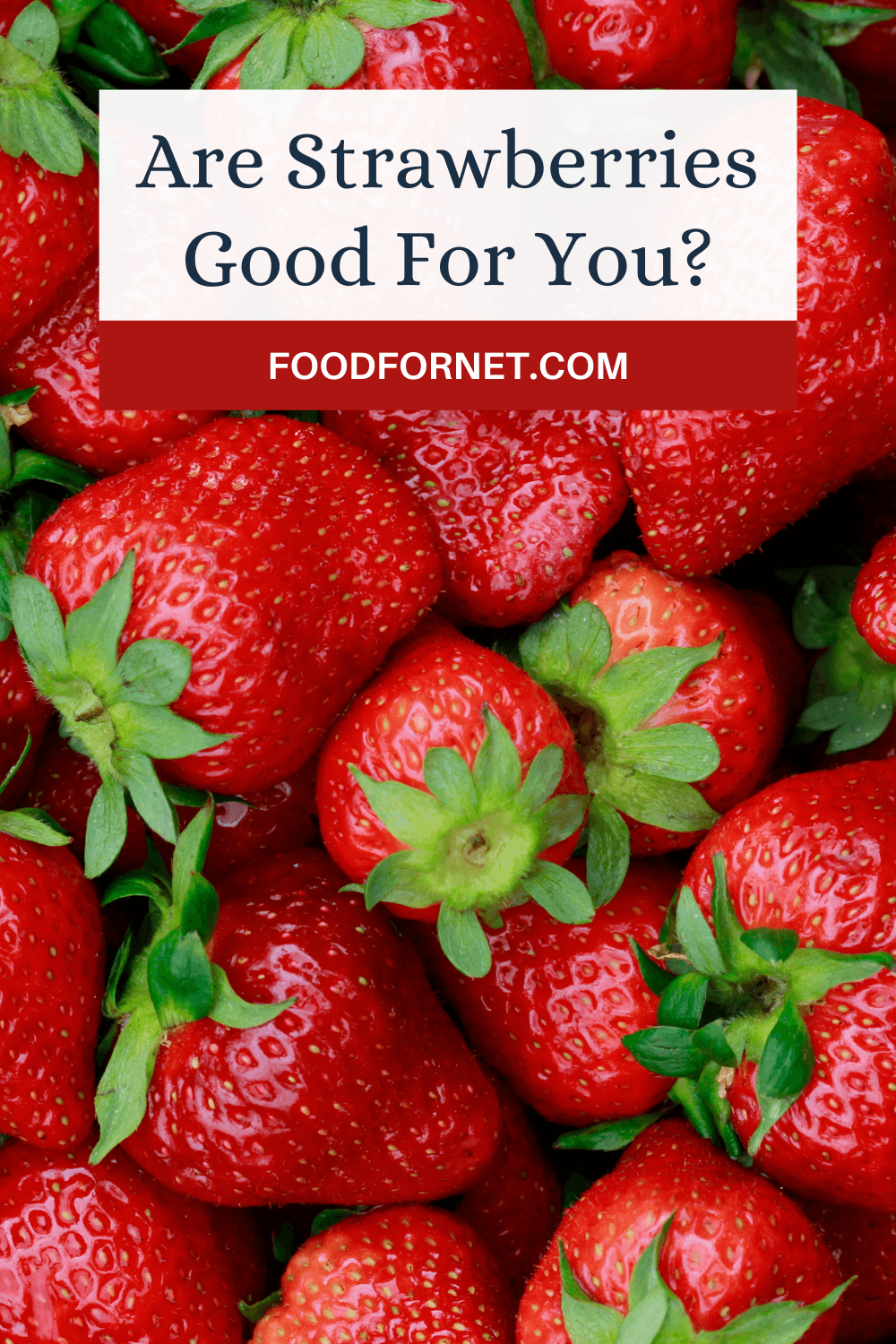
Who doesn’t love strawberries? They’re easily the most popular type of berry, one that is an excellent addition to your desserts and is even more delicious when freshly picked. They’re also used in many recipes, are easy to buy online, and can be grown in your own garden. So are strawberries good for you?
You can probably already guess that strawberries have benefits. That’s no secret. Today, though, we’re asking: are strawberries good for you? That’s a slightly different question because answering it involves looking at the pros of strawberries and the cons, then seeing how the two of them balance out.
As we go through the discussion, remember that the most important thing is working out whether strawberries are the best choice for you. We’re all different and vary in our diets, genetics, metabolism, lifestyle, and countless ways. It’s not surprising that we have different needs when it comes to food as well.
Are Strawberries Good For You?
Benefits Of Strawberries

Their Vitamin C Content
Strawberries are exceptional for vitamin C, with 100 grams of the berries providing close to your daily needs for vitamin C. This is an essential vitamin, one that plays roles in the growth and repair of tissues throughout our bodies.
Vitamin C is found in many fruits and vegetables, so most of us are already getting enough of it through our diets. Still, there are thoughts that higher levels of vitamin C might improve health further, by decreasing our risk of some types of disease, lowering blood pressure, and improving our immune system function.
It’s hard to know how these effects play out in practice, but it’s easy enough to have a few more vitamin C rich foods in your diet and see how doing so affects your health.
They’re A Low FODMAP Food
If you have a sensitive stomach, then FODMAPs are important. These seemingly innocent carbs can ferment in your gut, leading to many uncomfortable side effects.
Fruit is always tricky for FODMAPs, as many types are high in FODMAPs, while others aren’t at all. Strawberries, thankfully, fall on the low FODMAP side of the equation, so they’re an easy choice for anyone with irritable bowel syndrome (IBS) or any other digestive issues.
If you do have IBS, then most other berries are a safe choice as well, except for blackberries. Blackberries tend to be high FODMAP, so it’s best to avoid these.
Also, if you are sensitive to FODMAPs, try sticking to one serving of fruit at a time. This helps to prevent your fructose load from getting too high. Doing so is important even if you’re sticking to low FODMAP fruits.
They’re Relatively Low In Carbs

Most berries are an excellent choice when you’re on a low carb diet. They tend to contain relatively few carbs per serving, along with plenty of fiber. In the case of strawberries, you get roughly 5 grams of sugar and 2 grams of fiber in a 100 gram serving. That’s exceptional.
Remember too that you can easily cut the serving size down further. In fact, a single strawberry only contains around 1 net gram of fiber. It’s not surprising, then, that plenty of keto recipes rely on strawberries, like these keto strawberry smoothies.
Actually, the fact that strawberries fit onto a keto diet makes them particularly powerful. Most types of fruit are difficult to include on a keto diet, which can be a problem, as the antioxidants from fruit are still very important.
Can Help With Blood Sugar Levels
Strawberries are surprisingly useful for your blood sugar levels, helping to keep them in check. Eating strawberries regularly might even help to decrease your risk for type 2 diabetes.
Berries can also improve the way your body responds to other foods, like decreasing your insulin response to bread. This is a powerful effect, regardless of whether you have diabetes or not. It also goes to show that sugar isn’t always the enemy. Some foods with sugar are much more useful than harmful.
A Decent Source Of Fiber
We can’t talk about benefits without mentioning fiber. After all, fiber is essential for your digestive health. If you don’t get enough of it, you’ll experience some pretty undesirable side effects, like constipation, fatigue, and more dramatic blood sugar changes.
The benefits of fiber don’t stop with digestive health either. Fiber also helps with your blood sugar and your cholesterol levels. Strawberries don’t contain nearly as much fiber per 100 grams as raspberries and blackberries, but you still get a decent amount (roughly 3 grams of fiber in a cup of strawberry halves).
Here’s another thing – the fiber in strawberries can help with constipation. You’re getting some water in the berries too, which helps to speed matters along.
Can Decrease Inflammation And Oxidation

Like other berries, strawberries contain a broad array of plant-based compounds, including antioxidants. These compounds all play various roles throughout our bodies.
Crucially, the compounds in berries are powerful for decreasing inflammation and oxidation.
Now, inflammation and oxidation are both natural processes (and important ones at that). Problems start to arise when there’s too much oxidation or inflammation, particularly for prolonged periods.
Foods like strawberries can be amazingly helpful, as have natural antioxidant and anti-inflammatory actions. These effects could even help to decrease the risk of some chronic diseases, including heart disease.
This protective effect is strongest when you rely on whole foods like berries. There are antioxidant supplements on the market, but research hasn’t linked them to many benefits at all.
This isn’t too surprising though. After all, whole foods have a wider variety of vitamins, minerals, and plant-based compounds than supplements, along with macronutrients like fat and fiber. These different components interact with one another and affect our health, giving many more benefits than a supplement could ever offer.
How Strawberries Could Be A Problem
Serious Pesticide Contamination
Pesticides are an issue for any fruit or vegetable and are a key reason for buying organic versions instead. In particular, some of the pesticides can remain on the surface of fruit even after they’ve been harvested and washed.
What this means for health is difficult to know.
On one hand, the pesticide levels are low and are considered to be safe. But, there’s still the risk that even low levels of pesticides cause significant harm in the long term.
Strawberries are more concerning than most other types of produce, as they topped EWG’s Dirty Dozen list in 2021. This list highlights foods with the highest levels of pesticide contamination.
As such, strawberries are one of the main fruits and vegetables that you should buy organic whenever possible.
You Might Get An Upset Stomach
Strawberries can give you an upset stomach if you eat too many of them – a pattern that’s true for all berries and many other types of fruit. You could experience gas, bloating, and even diarrhea as well.
These side effects aren’t a sign that there’s something wrong with your strawberries. They’re simply a result of the fiber.
Remember how important fiber is to your digestion? Well, this effect can sometimes cause unpleasant side effects if you increase your fiber intake suddenly or have a large amount of fiber at once. So, if you overdo it with berries, you’re likely to pay for it.
If you need more fiber in your diet, it’s best to start slowly with high fiber foods like berries. Doing so gives your system the chance to adjust, reducing the risk of side effects. Don’t forget to drink plenty of water too, as this helps to move everything along.
Which Berries Are The Healthiest?

Most of the benefits that we’ve talked about here apply to most types of berries. They all contain a decent amount of antioxidants and fiber, along with some nutrients, so they can all help to decrease your cholesterol levels, lower the risk of type 2 diabetes, and improve your digestion.
Blueberries are often seen as the healthiest type, but that’s just because of their ORAC score. ORAC scores are a measure of the antioxidant activity of a given food, but they’re not as important as they might seem.
The problem is that ORAC scores come from test tube research. High ORAC scores don’t necessarily translate to high antioxidant activity in our bodies. Plus, antioxidants do much more than just reduce oxidation.
If we ignore the ORAC score then, the various types of berries are similar. Here are some key features of each type (nutritional stats are for a 100 gram serving).
- Strawberries: 32 calories, 2 grams fiber, 4.9 grams sugar. Can have high pesticide residues.
- Blueberries: 57 calories, 2.4 grams fiber, 10 grams sugar. Higher in sugar than most other berries.
- Raspberries: 52 calories, 6.5 grams fiber, 4.4 grams sugar.
- Blackberries: 43 calories, 5.3 grams fiber, 4.9 grams sugar. High in FODMAPs.
- Cranberries: 46 calories, 4.6 grams fiber, 4 grams sugar. Normally used in recipes, rather than eaten on their own.
Which type of berry is best? Honestly, that depends on your needs. Blackberries and raspberries are ideal for low carb dieters, but the FODMAPs in blackberries could be a problem.
Remember too that that’s just a handful of the types of berries. There are many others too, all with their own nutritional profile.
Final Thoughts
There are plenty of good things about strawberries and not that many problems at all. In fact, the only stand out issue is the risk of pesticide contamination. We can’t take that one lightly, as strawberries are more heavily contaminated with pesticides than any other type of fruit.
Thankfully, the issue of pesticides doesn’t mean that you need to avoid strawberries. You can get around the problem entirely by focusing on organically grown strawberries. Or, why not grow your own?
It’s also important to store your strawberries well or perhaps even freeze them. After all, you don’t want them going moldy.
Frequently Asked Questions
Are Strawberries Keto Friendly?
Strawberries are decent for keto, giving you around 6 net grams of carbs in a 100 gram serving. Raspberries and blackberries are good as well, with 5 net grams of carbs in the same serving size.
Remember that fruit also provides valuable nutrients, antioxidants, and fiber. You should still be eating fruit regularly, even if you are following a keto diet.
Are Strawberries Good For Weight Loss?
Despite the sugar content, fruit really does help with weight loss. Strawberries are particularly good, as they’re fairly low in sugar, don’t contain many calories, and still have plenty of nutrients.
They’re also a delicious treat. This is important too, as it’s easier to stick to a weight loss plan when you enjoy what you eat.
Are Strawberries Acidic?
Like many berries, strawberries fall between a pH of 3 and 4, which makes them acidic. They’re most acidic when they’re unripe and become gradually less acidic as they ripen.
This acidity means that people with acid reflux need to be cautious with strawberries. Some will be able to eat the berries without a problem, while others will quickly experience side effects. If you’re worried about this, try having yogurt or milk at the same time.
How Long Do Strawberries Last?
If you keep strawberries in their original container in the fridge, they’ll generally last a few days. Being more proactive may help, but the berries may still go bad within a week.
Occasionally you’ll get longer out of your strawberries, like two weeks or perhaps even three. However, this is mostly true for freshly picked strawberries and you’re likely to still lose some along the way.
Are Strawberries Good For Diabetics?
Sugar isn’t something to avoid entirely as a diabetic. You can still eat some sugar-containing food, including strawberries. The fiber and antioxidants in the berries can even be helpful for your condition.
Plus, strawberries have a relatively low glycemic index. They’re much better than ripe bananas, pineapples, watermelon, and many dried fruits.









 12 Best Foods For Sour Stomach Issues, Plus Three Strategies For Preventing A Sour Stomach
12 Best Foods For Sour Stomach Issues, Plus Three Strategies For Preventing A Sour Stomach
Leave a Reply